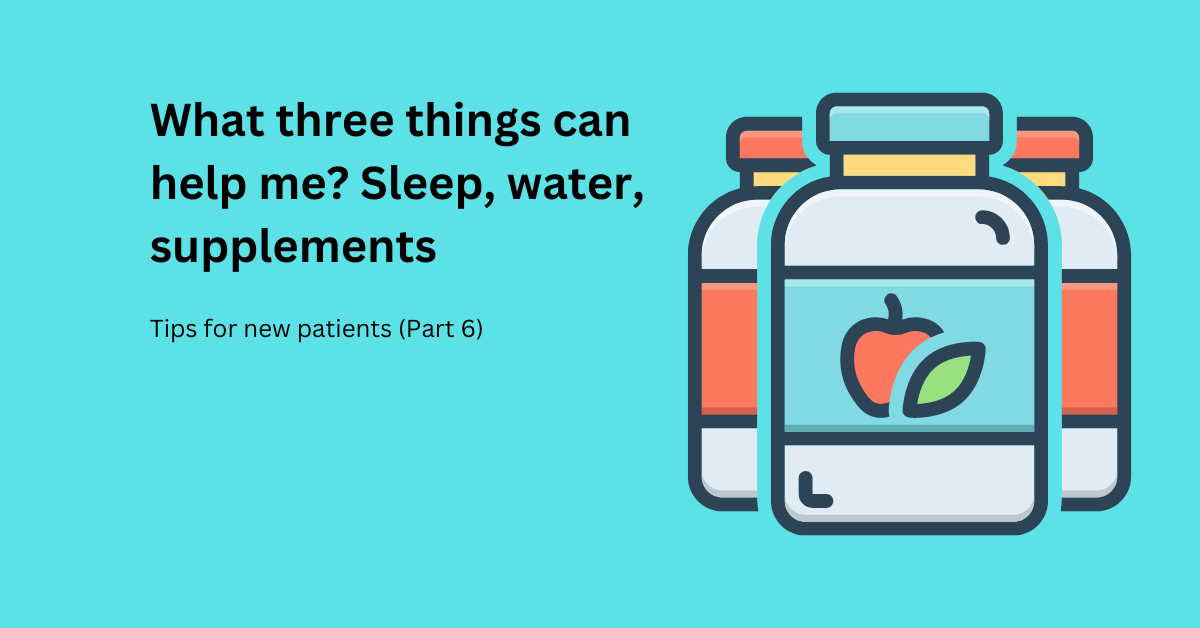Last time we went over 50 different ways you could lose your alignment. Hopefully it was eye-opening. Now it’s time to talk about the three things you can be doing at home to make the most of your spinal care, especially in the first couple of months.
The three things you can do at home to help your chiropractic care
These are three universal rules that will apply to 99% of people. There are plenty of other helpful things out there.
Sleep when you’re tired
Stress hormones increase and metabolism slows down the more sleep deprived you are. Much healing happens when we are sleeping, both physically, and psychologically.
If you are staying up more than you have to (insomnia is a different story), focus on getting more rest if you’re going to to anything specific to help yourself. When your body is in exhaustion mode, it’s in survival mode. Survival mode is about staying alive today, not staying healthy tomorrow.
I have personal experience with this. When I’m well rested, I can hold my alignment for months. If I pull a few 3-4 hour nights in a row, I’m more likely to need another chiropractic adjustment.
Drink water before you’re thirsty
Hydration is 100% necessary for your soft tissues. All those soft parts around your bones require lots of water to be healthy, especially the discs between the spinal bones.
If you are asking your body to remodel that tissue, without giving it the water it needs, you are taking two steps forward and one step back. Might as well drink, stay hydrated, and move three steps forward more often.
That said, I’m not necessarily advocating that everyone needs to drink half their body weight in ounces on a daily basis to “stay hydrated.” Different sources of water have different mineral content, which is necessary for electrolyte balance. Different environments and activity levels will lead to more or less water loss.
Aim to stay hydrated enough that your urine has a light straw color. Darker requires more water, and very lightly colored urine means you’re drinking too much at once.
Take good quality supplementation, within reason
I believe it is helpful to take good quality supplementation to cover gaps in essential vitamins and minerals for a less than pristine and healthy diet, especially when it comes to healing soft tissue.
But we should acknowledge a few things…
Studies on vitamins are all over the place: some say they are helpful, and some say they aren’t. Many of those studies that say vitamins don’t do anything are studies on high doses of synthetic vitamins.
I am not a huge fan of big box store supplements. Personally, I would choose to avoid buying many supplements at a store like this unless I investigated it.
Different supplement companies hold themselves to different standards in their manufacturing process. Some are audited and certified by outside bodies like NSF and their GMP program, and some aren’t. Independent research has shown that in some instances, supplements can also be contaminated with trace amounts of chemicals that are harmful, even in high quality supplements. Unfortunately, food and other products can also be contaminated.
All of this is to say that where you source your supplements is important and does matter. My family takes Standard Process on a regular basis, which is a whole food supplementation company. I tell you this since most people ask after having this conversation.
There are other companies out there that I would also be comfortable taking for specific reasons.
Basic supplementation for average middle aged Americans?
What supplements should you take? If most middle aged adults eating a standard American diet took the following, it would probably be an improvement
- Vitamin D from fall through spring (amount will vary depending on location and health status – persistent low levels of D should be investigated and high doses for long periods of time may not always be beneficial)
- A natural anti-inflammatory taken cyclically (Boswellia, Cercumin/Tumeric, Quercitin, etc),
- Probiotics in the form of supplementation or in the form of fermented foods like Kefir, high quality yogurt, or Saurkraut, etc.
- Vitamin C taken cyclically
- Magnesium (there are a variety of options, magnesium citrate may be a good first option to try)
- Omega-3 fatty acids (fish oil)
- Protein supplementation (diet dependent)
- Proteolytic enzymes to aid digestion (from animal or vegetable sources) especially if chronic digestive issues are present
- Announcing the Winter Boot Drive of 2024 (to benefit homeless) - December 16, 2023
- Thoughts determine the quality of life – Tips for new patients (Part 8) - September 18, 2023
- Why hasn’t anyone told this to me before? Tips for new patients (Part 7) - September 18, 2023


